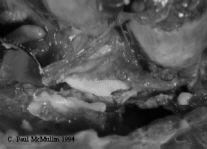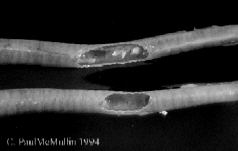ThePoultrySite Quick Disease Guide
Respiratory Disease Complex
|
Extracted From:
A Pocket Guide to
Poultry Health and Disease 
|
Introduction
Respiratory infections in chicken and turkeys are seen worldwide but especially in temperate poultry-producing areas in winter months. A number of respiratory viruses (Infectious Bronchitis, Avian pneumovirus, Lentogenic Newcastle disease virus, vaccinal and field strains) and bacteria (Ornithobacterium rhinotracheale, E. coli) may be involved. Dust, ammonia and other gases, and other factors associated with poor ventilation, may act as predisposing factors. Morbidity is typically 10-20%, mortality 5- 10%. If condemned birds are included mortality may be more than 10%.
Signs
- Snick.
- Sneezing.
- Head swelling.
- Conjunctivitis.
- Nasal exudate.
- Rattling noises.
Post-mortem lesions
- Severe tracheitis with variable exudate - catarrhal to purulent.
- Airsacculitis.
- Pericarditis.
Diagnosis
Lesions, serology, response to environmental changes. Differentiate from Chronic Respiratory Disease (Mycoplasmosis). Given that many flocks are vaccinated it is necessary to establish normal serological response in vaccinated flocks in the absence of disease (some of which may, of course, be challenged by some of these pathogens).
Treatment
Antimicrobial treatment of specific bacterial infections.
Prevention
Effective ventilation, sanitation of drinking water, carefully applied appropriate viral vaccines.
 |
| Figure 29. Severe airsacculitis of thoracic air sacs in a broiler close to slaughter. The air sacs are thickened and congested, and have been cut into to reveal a cheesy (caseous) mass of pus. There is also percarditis evident (at top right). |
 |
| Figure 30. Severe tracheitis is broilers with respiratory disease complex. Both tracheas were congested and the upper sample had mucopurulent material in the lumen. |


 © 2000 - 2021. Global Ag MediaNinguna parte de este sitio puede ser reproducida sin previa autorización.
© 2000 - 2021. Global Ag MediaNinguna parte de este sitio puede ser reproducida sin previa autorización.